美国文学名词解释
美国文学名词解释

1 The Enlightenment(启蒙运动): The Enlightenment was an intellectual movement originating in France, which attracted widespread support among the ruling and intellectual classes of Europ e and North America in the second half of the 18th century. It characterizes the efforts by certain European writers to use critical reason to free minds from prejudice, unexamined authority and oppression by Church or State. Therefore, the Enlightenment is sometimes called the Age of Reason2 American Dream(美国梦): It is the faith held by many in the United States of America that through hard work, courage, and determination one can achieve a better life for oneself, usually through financial prosperity. These were values held by many early European settlers, and have been passed on to subsequent generations. Nowadays the American Dream has led to an emphasis on material wealth asmeasure of success or happiness3. Transcendentalism (超验主义、先验主义) : It was a group of new ideas in literature, religion, culture and philosophy that emerged in New England in the middle 19th century. It began as a protest against the general state of culture and society. Among transcendentalist’s core beliefs was an ideal spiritual state that “transcends” the physical and empirical(以观察或实验为依据的) and is only realized through the individual’s intuition, rather than through the doctrines of established religions. Prominent transcendentalists included Ralph Waldo Emerson(爱默生), Henry David Thoreau(梭罗), Walt Whitman(惠特曼), etc. It is a kind of philosophy that stresses belief in transcendental things and the importanceof spiritual rather than material existence. (相信超凡的事物,认为精神存在比物质存在更重要).4. American Puritanism: It is the practices and beliefs of the Puritans. The Puritans were originally members of a division of the Puritan Church. The first settlers who became the founding fathers of the American nation were quite a few of them. They were a group of serious, religious people, advocating highly religious and moral principles. As the word itself hints, Puritans wanted to purity their religious beliefs and practices. They accepted the doctrine of predestination宿命论, original sin and total depravity性恶说, and limited atonement 有限的救赎 through a special infusion 浸渍 of grace from God. As a culture heritage, Puritanism did havea profound influence on the early American mind.5.Symbolism:It is the writing technique of using symbols. It’s a literary movement that arose in France in the last half of the 19th century and that greatly influenced many English writer, particularly poets, of the 20th century. It enables poets to compress a very complex idea or set of ideas into one image or even one word. It’s one of the most powerful devices thatpoets employ in creation.7.Gothic novel is a type of romance very popular late in the 18th century and at the beginning of the 19th century.Gothic novel emphasizes things which are grotesque怪异的, violent, mysterious, supernatural,desolate 荒凉 and horrifying. Gothic, originally in the sense of“medic医学,not classical”,with its descriptions of the dark,irrational side of human nature,Gothic novel has exerted a great influence over the writers of the Romantic period.8 Imagism: it’s a poetic movement of England and the U.S flourished from 1909 to 1917. The movement insists on the creation of images in poetry by “the direct treatment of the thing” and the economy of wording. The leaders of this movement were Ezra Pound and Amy Lowell艾米•洛威尔.8. Imagism: It came into being in Britain and U.S around 1910 as a reaction to the traditional English poetry to express the sense of fragmentation and dislocation. The imagists, with Ezra Pound leading the way, hold that the most effective means to express these momentary impressions is through the use of one dominant image. Imagism is characterized by the following three poetic principles: direct treatment of subject matter; economy of expression; as regards rhythm, to compose in the sequence of the musical phrase, not in the sequence of metronome 节拍器. Pound’s “In a Station of the Metro” is a well-known imagist poem.9. Stream of Consciousness(意识流): It is a style used in the presentation of the character’s inner working of mind. The assumption is that an individual’s psychological processes are a continuous flow like a shifting, uninterrupted stream, highly changeable and confusing, often appearing illogical and contrary to reason. In tracing the stream of consciousness of an individual the writer may present interior monologue(内心独白) by his character, hint with symbols, reverse(颠倒) the order of time, and alternate(轮流的/交替的) recollections(回忆) with the present or sometime illusions(幻想) with given facts.10. Point of view( 视角):It is a term referring to the vantage point (能观察某事物的有利位置) or position from which a story is told. To identify(识别) the narrator of a story is to identify the story’s point of view. Basically there are two narrative ways: first-person point of view and the third-personpoint of view.12. The Harlem Renaissance: it was the first important movement in black American literature. Immediately after the First World War, as a result of a massive black migration to Northern cities, a group of young, talented black artists congregated in Harlem, a predominantly black section of New York City, and made it the cultural, and intellectual capital of black America. They carried forward the cultural traditions of their people and demonstrated their achievements to the white society that habitually ignored them.13. Expressionism 表现主义: it arouse in German theater after World War I. Delighting in bizarre (奇异的) stage design and exaggerated makeup and costuming(服装), expressionists sought to reflect intense states of emotion. Its mode is “the externalization(外表性) of t he inner.”14.Black humor: It is a combination of humor with resentment(怨恨), gloom, anger, and despair. Seeing all that is unreasonable, hypocritical,ugly, and even frenzied(狂乱的),writers of black humor nurse a grievance(不平) against their society which, according to them, is full of institutionalized(制度化的) absurdity. Yet they are cynical. They laugh a morbid(病态的) laugh when facing the hideous(丑恶的). In hopeless indignation(愤慨) they take up freezing irony and burning satire as their weapons. Their novels are often in the form of anti-novel(反传统小说), devoid of(缺乏) completeness of plot and characterized by fragmentation (零碎的) and dislocation(混乱).(专业文档资料素材和资料部分来自网络,供参考。
美国文学术语解释(全面且简练)

美国文学术语解释(全面且简练)美国文学是指具有美国独特文化地域色彩的文学作品。
包括小说、戏剧、诗歌、散文以及加拿大和多明尼加等国家的文学作品。
其短篇小说及戏剧都有着浓厚的美国文化特色,其龙头主流的文学派别是在17世纪后期形成的新约克郡派,主要有约翰•德拉谢尔(John Dryden)、Jonathan Swift 等人,他们为美国文学写下了精彩绝伦的篇章。
新约克郡派把文章写成了装满宗教特质、歌颂胜利、崇高赞美的模式,也就是赞美诗,发掘探索细节、夸张搭配修辞,准确表达真实情境,是后期美国文学的重要基础;而在早期的美国文学发展史上,更多的是宗教文学。
随着美国政治的发展,社会文化的不断进步,宗教文学慢慢地被实用的文学文本所取代。
美国的文学活动开始贴近人文主义的文学脉络,表现出散文风格,致力于针对现状的批判性反思以及自我叙述性自觉。
然而,到了18世纪末,受英国文学传统影响,美国文学正式步入正轨,并开始向两群导向,即诗歌与小说。
第一类作品赞美自然风景、积极的立场或事实内容,通过句法、修辞手法和宋体表达,以“说服力”为特征;而小说,基本上描写人物及其情感,作者给予考量和评析,以构建一个小说世界。
有关美国文学习派别方面,它指的是具有某种特殊特性的作品、作者或趋势,这些特性可以汇聚成学派,如经典主义派、象征主义派、古典注重艺术形式翻新派、现代主义派、问题类型派、客观散文派等等。
美国文学家们也是新的运动的团体来提倡这些派别,如1820年墨西哥战争、当时的托马斯汉密尔顿著名的圣教徒笃信运动引起的“波厄特派”,其中的小说作家和写报人表达了一种激进的、反殖民主义的文学潮流。
波厄特派的影响很大,它声称小说应该坚持自然、客观原则,实证严谨,保持超验主义,而不是神话传说,也不是把文学作品改写成像诗歌一样的形式。
自19世纪初美国文学思想开始发展至今,美国文学进入了一个更加多样化、开放空间愈加广阔的阶段,无论是宗教、哲学还是政治新思想都将重新回归到文学之中,美国文学也变得更加丰富多彩了。
美国文学名词解释

1. Transcendentalism—it is a philosophic and literary movement that flourish in New England, as a reaction against rationalism and Calvinism. It stressed intuitive understanding of god without the help of the church, and advocated independence of the mind. 超验主义,它是一个蓬勃发展的新英格兰的哲学和文学运动,反对理性主义和加尔文主义的反应。
它强调直观地了解上帝没有教会的帮助下,主张心灵的独立性。
2. Romanticism had appeared in England in the last years of the eighteenth century. It spread to conti nental Europe and then came to America early in the nineteenth century. It came into being as a re action against the prevailing neoclassical spirit and rationalism during the Age of Reason. 浪漫主义曾经出现在英国,在过去几年的十八世纪。
它蔓延到欧洲大陆,然后来到美国在十九世纪初。
它应运而生作为理性的时代中针对当时新古典主义精神和理性的反应。
3. Puritanism—it is the religious belief of the Puritans, who had intended to purify and simplify the religious ritual of the Church of England. 清教主义,它是清教徒,谁曾打算净化和简化英国教会的宗教礼仪的宗教信仰。
美国文学的名词解释_特点_流派
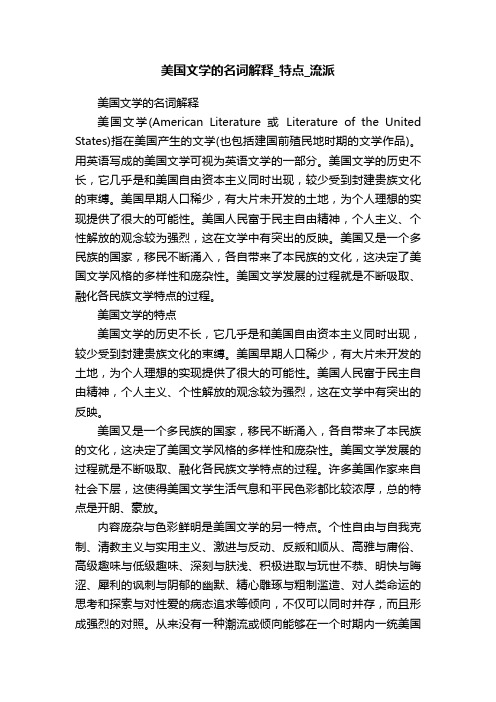
美国文学的名词解释_特点_流派美国文学的名词解释美国文学(American Literature 或Literature of the United States)指在美国产生的文学(也包括建国前殖民地时期的文学作品)。
用英语写成的美国文学可视为英语文学的一部分。
美国文学的历史不长,它几乎是和美国自由资本主义同时出现,较少受到封建贵族文化的束缚。
美国早期人口稀少,有大片未开发的土地,为个人理想的实现提供了很大的可能性。
美国人民富于民主自由精神,个人主义、个性解放的观念较为强烈,这在文学中有突出的反映。
美国又是一个多民族的国家,移民不断涌入,各自带来了本民族的文化,这决定了美国文学风格的多样性和庞杂性。
美国文学发展的过程就是不断吸取、融化各民族文学特点的过程。
美国文学的特点美国文学的历史不长,它几乎是和美国自由资本主义同时出现,较少受到封建贵族文化的束缚。
美国早期人口稀少,有大片未开发的土地,为个人理想的实现提供了很大的可能性。
美国人民富于民主自由精神,个人主义、个性解放的观念较为强烈,这在文学中有突出的反映。
美国又是一个多民族的国家,移民不断涌入,各自带来了本民族的文化,这决定了美国文学风格的多样性和庞杂性。
美国文学发展的过程就是不断吸取、融化各民族文学特点的过程。
许多美国作家来自社会下层,这使得美国文学生活气息和平民色彩都比较浓厚,总的特点是开朗、豪放。
内容庞杂与色彩鲜明是美国文学的另一特点。
个性自由与自我克制、清教主义与实用主义、激进与反动、反叛和顺从、高雅与庸俗、高级趣味与低级趣味、深刻与肤浅、积极进取与玩世不恭、明快与晦涩、犀利的讽刺与阴郁的幽默、精心雕琢与粗制滥造、对人类命运的思考和探索与对性爱的病态追求等倾向,不仅可以同时并存,而且形成强烈的对照。
从来没有一种潮流或倾向能够在一个时期内一统美国文学的天下。
美国作家敏感、好奇,往往是一个浪潮未落,另一浪潮又起。
作家们永远处在探索和试验的过程之中。
美国文学名词解释
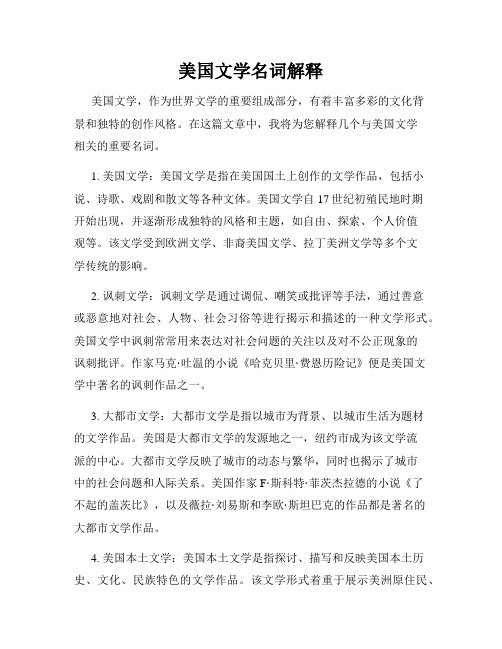
美国文学名词解释美国文学,作为世界文学的重要组成部分,有着丰富多彩的文化背景和独特的创作风格。
在这篇文章中,我将为您解释几个与美国文学相关的重要名词。
1. 美国文学:美国文学是指在美国国土上创作的文学作品,包括小说、诗歌、戏剧和散文等各种文体。
美国文学自17世纪初殖民地时期开始出现,并逐渐形成独特的风格和主题,如自由、探索、个人价值观等。
该文学受到欧洲文学、非裔美国文学、拉丁美洲文学等多个文学传统的影响。
2. 讽刺文学:讽刺文学是通过调侃、嘲笑或批评等手法,通过善意或恶意地对社会、人物、社会习俗等进行揭示和描述的一种文学形式。
美国文学中讽刺常常用来表达对社会问题的关注以及对不公正现象的讽刺批评。
作家马克·吐温的小说《哈克贝里·费恩历险记》便是美国文学中著名的讽刺作品之一。
3. 大都市文学:大都市文学是指以城市为背景、以城市生活为题材的文学作品。
美国是大都市文学的发源地之一,纽约市成为该文学流派的中心。
大都市文学反映了城市的动态与繁华,同时也揭示了城市中的社会问题和人际关系。
美国作家F·斯科特·菲茨杰拉德的小说《了不起的盖茨比》,以及薇拉·刘易斯和李欧·斯坦巴克的作品都是著名的大都市文学作品。
4. 美国本土文学:美国本土文学是指探讨、描写和反映美国本土历史、文化、民族特色的文学作品。
该文学形式着重于展示美洲原住民、欧洲移民、非裔美国人和其他少数族裔的文化传统和经验。
美国作家奥兰多·费斯特的小说《渐近线》以及路易斯·埃里斯的小说《米南多洛之歌》都是美国本土文学的代表作品。
5. 后现代主义文学:后现代主义文学是指具有反传统、颠覆常规、模糊现实与虚幻界限的文学形式。
在晚20世纪以后的美国文学中,后现代主义作品开始兴起。
该文学形式常常使用非线性叙事、多重视角和流派的混合等技巧来表达个体性、主观性和相对主义等概念。
美国作家托马斯·品钦的小说《地下时光》以及大卫·福斯特·华莱士的小说《无人生还》都是后现代主义文学的代表作品。
美国文学术语解释
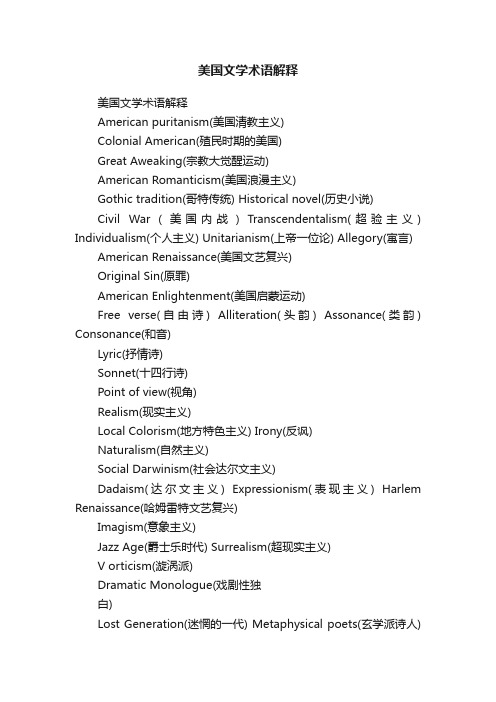
美国文学术语解释美国文学术语解释American puritanism(美国清教主义)Colonial American(殖民时期的美国)Great Aweaking(宗教大觉醒运动)American Romanticism(美国浪漫主义)Gothic tradition(哥特传统) Historical novel(历史小说)Civil War(美国内战)Transcendentalism(超验主义) Individualism(个人主义) Unitarianism(上帝一位论) Allegory(寓言) American Renaissance(美国文艺复兴)Original Sin(原罪)American Enlightenment(美国启蒙运动)Free verse(自由诗) Alliteration(头韵) Assonance(类韵) Consonance(和音)Lyric(抒情诗)Sonnet(十四行诗)Point of view(视角)Realism(现实主义)Local Colorism(地方特色主义) Irony(反讽)Naturalism(自然主义)Social Darwinism(社会达尔文主义)Dadaism(达尔文主义) Expressionism(表现主义) Harlem Renaissance(哈姆雷特文艺复兴)Imagism(意象主义)Jazz Age(爵士乐时代) Surrealism(超现实主义)V orticism(漩涡派)Dramatic Monologue(戏剧性独白)Lost Generation(迷惘的一代) Metaphysical poets(玄学派诗人)Narrator(叙述者)Stream of Consciousness(意识流) The Beat Generation(垮掉的一代) The 1930s(美国30年代)New Criticism(新批评主义) Theatre of the Absurd(荒诞剧) Postmodernism(后现代主义) Metafiction(元小说) Confessional poetry(自白派诗歌) The New York School(纽约派诗人)The absurd(荒谬派)Parody(戏讽)Magic realism(魔幻现实主义) The National Association for the Advancement of ColoredPeople(NAACP)(美国有色人种协进会)The Native American Renaissance(土著美国人文艺复兴)。
美国文学名词解释整理版
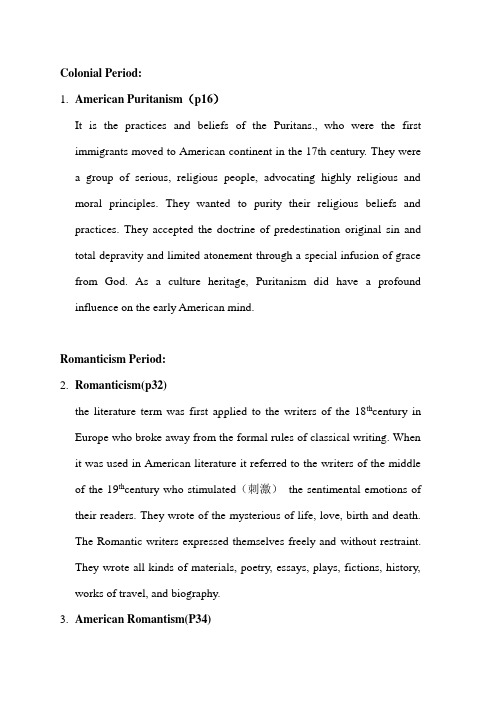
Colonial Period:1.American Puritanism(p16)It is the practices and beliefs of the Puritans.,who were the first immigrants moved to American continent in the 17th century. They werea group of serious, religious people, advocating highly religious andmoral principles. They wanted to purity their religious beliefs and practices. They accepted the doctrine of predestination original sin and total depravity and limited atonement through a special infusion of grace from God. As a culture heritage, Puritanism did have a profound influence on the early American mind.Romanticism Period:2.Romanticism(p32)the literature term was first applied to the writers of the 18th century in Europe who broke away from the formal rules of classical writing. When it was used in American literature it referred to the writers of the middle of the 19th century who stimulated(刺激)the sentimental emotions of their readers. They wrote of the mysterious of life, love, birth and death.The Romantic writers expressed themselves freely and without restraint.They wrote all kinds of materials, poetry, essays, plays, fictions, history, works of travel, and biography.3.American Romantism(P34)①it is one of the most important periods in the history of American literature that stretches from the 18th century to the outbreak of the civil war. It started with the publication of Washington Irving‟s The Sketch Book and ended with Walt Whitman‟s Leaves of Grass.②being a period of the great flowering of American literature, it is also called “the American Renaissance ”.③American romantic works emphasize the imaginative and emotional qualities of nature literature. The strong tendency to eulogize the individual and common man was typical of this period. Most importantly, the writings of American Romanticism are typically American. Works concentrate on unique characteristics of the American land.⑤Romanticists include such literary figures as Washington Irving, Ralph Waldo Emerson, Henry David Thoreau, William Cullen Bryant, Henry Wordsworth Longfellow, Nathaniel Hawthorne, Edgar Allan Poe, Herman Melville, Walt Whitman and some others.4.Gothic tradition (哥特传统)Gothic novel or Gothic romance is a story of terror and suspense, usually set in a gloomy old castle or monastery very popular late in the 18th century and at the beginning of the 19th century.In an extended sense, many novels do not have a medievalzed setting, but share a comparably sinister, grotesque, or claustrophobic atmosphere have been classed as Gothic. It contributed to the new emotional climate of Romanticism.5.Transcendentalism (先验说,超越论)(p47)It is a philosophic and literary movement that flourished in New England, particular at Concord, as a reaction against Rationalism and Calvinism (理性主义and喀尔文主义). Mainly it stressed intuitive understanding of God, without the help of the church, and advocated independence of the mind,stress the importance of the Over-soul, the Individual and Nature.The representative writers are Emerson and Thoreau.6.Stream of consciousness(意识流):It is one of the modern literarytechniques. It is the style of writing that attempts to imitate the natural flow of a character‟s thoughts, feelings, reflections, memories, and mental images as the character experiences them. It was first used in 1922 by the Irish novelist James Joyce. Those novels broke through the bounds of time and space, and depicted vividly and skillfully the unconscious activity of the mind fast changing and flowing incessantly。
美国文学名词解释
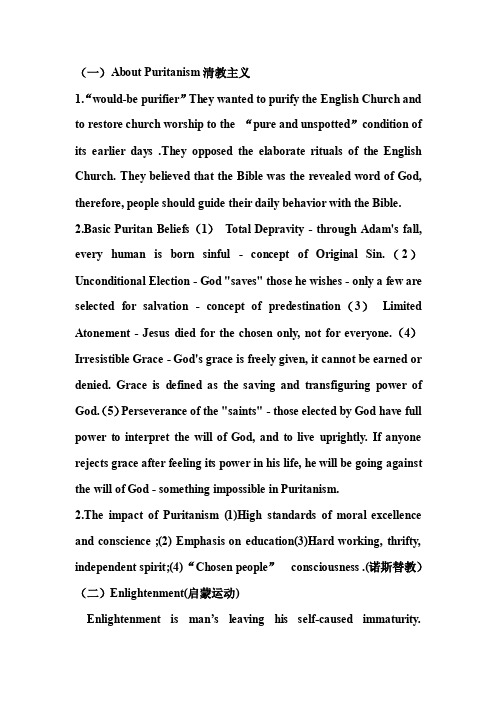
(一)About Puritanism清教主义1.“would-be purifier”They wanted to purify the English Church and to restore church worship to the “pure and unspotted”condition of its earlier days .They opposed the elaborate rituals of the English Church. They believed that the Bible was the revealed word of God, therefore, people should guide their daily behavior with the Bible.2.Basic Puritan Beliefs(1)Total Depravity - through Adam's fall, every human is born sinful - concept of Original Sin.(2)Unconditional Election - God "saves" those he wishes - only a few are selected for salvation - concept of predestination(3)Limited Atonement - Jesus died for the chosen only, not for everyone.(4)Irresistible Grace - God's grace is freely given, it cannot be earned or denied. Grace is defined as the saving and transfiguring power of God.(5)Perseverance of the "saints" - those elected by God have full power to interpret the will of God, and to live uprightly. If anyone rejects grace after feeling its power in his life, he will be going against the will of God - something impossible in Puritanism.2.The impact of Puritanism (1)High standards of moral excellence and conscience ;(2) Emphasis on education(3)Hard working, thrifty, independent spirit;(4)“Chosen people”consciousness .(诺斯替教)(二)Enlightenment(启蒙运动)Enlightenment is man’s leaving his self-caused immaturity.Immaturity is the incapacity to use one's intelligence without the guidance of another.@A term used to describe the trends in thought and letters in Europe and the American colonies during the 18th century prior to the French Revolution. The precursors of the Enlightenment can be traced to the 17th century and earlier.@The phrase was frequently employed by writers of the period itself, convinced that they were emerging from centuries of darkness and ignorance into a new age enlightened by reason, science, and a respect for humanity.(三)Romanticism (浪漫主义)As an approach in literary creation, romanticism is ever present in literature of all times. But as a literary trend or movement, it occurred and developed in Europe and America at the turn of the 18th and 19th centuries under the historical background of the Industrial Revolution around 1760 and the French Revolution (1789-1799). @ A movement in the literature of virtually every country of Europe, the United States, and Latin America that lasted from about 1750 to about 1870,@It was characterized by reliance on the imagination and subjectivity, freedom of thought and expression, and an idealization of nature.(四)Transcendentalism(超验主义)Transcendentalism is the summit of the Romantic Movement in theU.S. in the first half of the 19th century. It asserts the existence of an ideal spiritual reality that transcends the empirical and scientific and is knowable through intuition .Transcendentalists place emphasis on the importance of the Over-soul, the individual and Nature. It was, in essence, romantic idealism on Puritan soil.(五)Free versepoetry without a fixed beat or regular rhyme scheme.(六)Blank verse“Blank verse” is poetry written in regular metrical but unrhymed lines, almost always iambic pentameters.(七)American Realism (1865—1918)(现实主义)American Realism came in the latter half of the nineteenth century as a reaction against Romanticism. It stresses truthful treatment of material. It focuses on commonness of the lives of the common people, and emphasizes objectivity and offers an objective rather than an idealistic view of human nature and human experience. The three dominant figures of the period are William Howells, Mark Twain, and Henry James.(八)Definition of Local Color(乡土特色)1.Literature that focuses on the characters, dialect, customs, topography(地形), and other features particular to a specific region that exploits the speech, dress, mannerisms, and habits of thatspecific region .2.Twain’s Local colorismTwain preferred to present social life through portraits of the local characters of his regions, including people living in that area, the landscape, and other peculiarities like the customs, dialects, costumes and so on. So the rich material of his boyhood experience on the Mississippi became endless resources for his fiction, and the Mississippi valley and the west became his major theme.(九)American Naturalism (1890s-1910s) (自然主义)1.Historical Background:—The spread of industrialization created extremes of wealth and poverty. —Farmers were still going westward, but frontiers were about the close. They had to depend on the transcontinental railway to transport their products.—The spread of Darwin’s theory of evolution changed people’s ideology.2. Thematically, naturalistic writers:-- wrote detailed descriptions of the lives of the downtrodden and of the abnormal-- had frank treatment of human passion and sexualit-- were concerned about how men and women were overwhelmed by the forces of environment and by the forces of heredity-- made detailed documentation of life: nothing but the truth, more naked and wicked than realism-- created gloomy and pessimistic atmosphere3. Here are the major features of naturalism.Humans are controlled by laws of heredity and environment.The universe is cold, godless, indifferent and hostile to human desires. @Naturalistic writers are pessimistic. They choose their subjects from the lower.(10)Modernism(现代主义)(1)appeared after World War I(2)cutting off history and a sense of despair and loss(3)refusing to accept the traditional concept of value and all traditional ideological influences.1. BackgroundIn the first world war, America got considerable benefits with animal cost, but many artist and thinkers with suffering consciousness felt the terribleness of modern wars.Their heroism in mind gradually disappeared. Some of them going into battle suffered the sight of blood and all kinds of disasters. After back to America, they found that the social reality had experienced great change.2.Features or changes of the period(1)Increasing industrialization (2)Deepening urbanization(3)High speed development of technology and science(4 )Trauma of the first world war(5)1930s economic depression(6)Collapse of social value system(7)Dropping moral standards(8)Common depression , fear ,sense of loss3. Features of the worksFreud’s psychoanalysis ,William James stream of consciousnesstheory and archetypal symbol had great impact on the writers of modern American writers. They pay special attention to the inner world of the people, during this period ,the most compelling literature movement is the writer’s self exile, also known as the second American renaissance .(十一)Novelists ——the Lost Generation“迷惘的一代”(1920s) The novelists who produced a literature of disillusionment in the aftermath of World War I, and some of them lived abroad:(1)Used their wartime experience as the basis for their works (2)were cut off from old values yet unable to come to terms with the new era(3)wondered pointlessly and restlessly(4)were frustrated by the war(5)spokesman ——Hemingway(十二)The Jazz AgeThe Jazz Age is the nickname in America of the decade of the 1920’s, beginning from 1919 to the Crash at the end of 1929.These ten years were, for Americans, a time of carefree prosperity, isolated from the world’s problem, bewildering great social change, and a feverish pursuit of pleasure.These were the ten years when the First World War was just over, when new inventions and manufacturing techniques greatly changed the way people lived; when people moved from the countryside in great numbers; when women won the right to vote and many started to earn their own money; when cars,washing machines,radios and vacuum cleaners became commonplace; and when millions of people lived beyond their means and went into debt in order to obtain such things while the middle class frantically pursued individual “success”and personal enjoyment. They lived a rich, extravagant, frivolous moneymaking life, and it was this style of living gave the decade of the 1920’s such nickname as the “Jazz Age”, the “Dollar Decade”, and the “Roaring Twenties.”(十三)Imagism(1900S-1910S)(意象派)The Imagist movement included English and American poets in the early twentieth century who wrote free verse and were devoted to "clarity of expression through the use of precise visual images." The Imagist Movement began in London and later spread to the US. It underwent three major phases in its development.(十四)IronyA contrast or discrepancy between what is said and what is meant or between what happens and what is expected to happen in life and in literature.。
美国文学术语解释
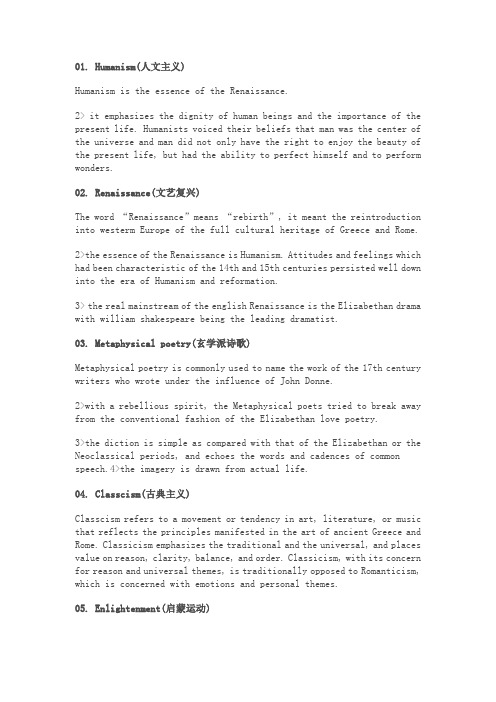
01. Humanism(人文主义)Humanism is the essence of the Renaissance.2> it emphasizes the dignity of human beings and the importance of the present life. Humanists voiced their beliefs that man was the center of the universe and man did not only have the right to enjoy the beauty of the present life, but had the ability to perfect himself and to perform wonders.02. Renaissance(文艺复兴)The word “Renaissance”means “rebirth”, it meant the reintroduction into westerm Europe of the full cultural heritage of Greece and Rome.2>the essence of the Renaissance is Humanism. Attitudes and feelings which had been characteristic of the 14th and 15th centuries persisted well down into the era of Humanism and reformation.3> the real mainstream of the english Renaissance is the Elizabethan drama with william shakespeare being the leading dramatist.03. Metaphysical poetry(玄学派诗歌)Metaphysical poetry is commonly used to name the work of the 17th century writers who wrote under the influence of John Donne.2>with a rebellious spirit, the Metaphysical poets tried to break away from the conventional fashion of the Elizabethan love poetry.3>the diction is simple as compared with that of the Elizabethan or the Neoclassical periods, and echoes the words and cadences of common speech.4>the imagery is drawn from actual life.04. Classcism(古典主义)Classcism refers to a movement or tendency in art, literature, or music that reflects the principles manifested in the art of ancient Greece and Rome. Classicism emphasizes the traditional and the universal, and places value on reason, clarity, balance, and order. Classicism, with its concern for reason and universal themes, is traditionally opposed to Romanticism, which is concerned with emotions and personal themes.05. Enlightenment(启蒙运动)Enlightenment movement was a progressive philosophical and artistic movement which flourished in france and swept through western Europe in the 18th century.2> the movement was a furtherance of the Renaissance from 14th century to the mid-17th century.3>its purpose was to enlighten the whole world with the light of modern philosophical and artistic ideas.4>it celebrated reason or rationality, equality and science. It advocated universal education.5>famous among the great enlighteners in england were those great writers like Alexander pope. Jonathan swift.etc.06.Neoclassicism(新古典主义)In the field of literature, the enlightenment movement brought about a revival of interest in the old classical works.2>this tendency is known as neoclassicism. The Neoclassicists held that forms of literature were to be modeled after the classical works of the ancient Greek and Roman writers such as Homer and Virgil and those of the contemporary French ones.3> they believed that the artistic ideals should be order, logic, restrained emotion and accuracy, and that literature should be judged in terms of its service to humanity.07. The Graveyard School(墓地派诗歌)The Graveyard School refers to a school of poets of the 18th century whose poems are mostly devoted to a sentimental lamentation or meditation on life. Past and present, with death and graveyard as themes.2>Thomas Gray is considered to be the leading figure of this school and his Elegy written in a country churchyard is its most representative work.08. Romanticism(浪漫主义)1>In the mid-18th century, a new literary movement called romanticism came to Europe and then to England.2>It was characterized by a strong protest against the bondage of neoclassicism, which emphasized reason, order and elegant wit. Instead, romanticism gave primary concern to passion, emotion, and natural beauty.3>In the history of literature. Romanticism is generally regarded as the thought that designates a literary and philosophical theory which tends to see the individual as the very center of all life and experience. 4> The English romantic period is an age of poetry which prevailed in England from 1798 to 1837. The major romantic poets include Wordsworth, Byron and Shelley.09. Byronic Hero(拜伦式英雄)Byronic hero refers to a proud, mysterious rebel figure of noble origin.2> with immense superiority in his passions and powers, this Byronic Hero would carry on his shoulders the burden of righting all the wrongs in a corrupt society. And would rise single-handedly against any kind of tyrannical rules either in government, in religion, or in moral principles with unconquerable wills and inexhaustible energies.3> Byron’s chief contr ibution to English literature is his creation of the “Byronic Hero”10. Critical Realism(批判现实主义)Critical Realism is a term applied to the realistic fiction in the late 19th and early 20th centuries.2> It means the tendency of writers and intellectuals in the period between 1875 and 1920 to apply the methods of realistic fiction to the criticism of society and the examination of social issues.3> Realist writers were all concerned about the fate of the common people and described what was faithful to reality.4> Charles Dickens is the most important critical realist.11. Aestheticism(美学主义)The basic theory of the Aesthetic movement--- “art for art’s sake” was set forth by a French poet, Theophile Gautier, the first Englishman who wrote about the theory of aestheticism was Walter Pater.2> aestheticism places art above life, and holds that life should imitate art, not art imitate life.3> According to the aesthetes, all artistic creation is absolutely subjective as opposed to objective. Art should be free from any influence of egoism. Only when art is for art’s sake, can it be immortal. They believed that art should be unconcerned with controversial issues, such as politics and morality, and that it should be restricted to contributing beauty in a highly polished style.4> This is one of the reactions against the materialism and commercialism of the Victorian industrial era, as well as a reaction against the Victorian convention of art for morality’s sake, or art for money’s sake.美学运动的基本原则”为艺术而艺术”最初由法国诗人西奥费尔.高缔尔提出,英国运用该美学理论的第一人是沃尔特.佩特.美学主义崇尚艺术高于生活,认为生活应模仿艺术,而不是艺术模仿生活.在美学主义看来,所有的艺术创作都是绝对主观而非客观的产物.艺术不应受任何功利的影响,只有当艺术为艺术而创作时,艺术才能成为不朽之作.他们还认为艺术不应只关注一些热点话题如政治和道德问题,艺术应着力于以华丽的风格张扬美.这是对维多利亚工业发展时期物质崇拜的一种回应,也是向艺术为道德或为金钱而服务的维多利亚传统的挑战.12.The Victorian period(维多利亚时期)In this period, the novel became the most widely read and the most vital and challenging expression of progressive thought. While sticking to the principle of faithful representation of the 18th century realist novel, novelists in this period carried their duty forward to criticism of the society and the defense of the mass.2> although writing from different points of view and with different techniques, they shared one thing in common, that is, they were all concerned about the fate of the common people. They were angry with the inhuman social institutions, the decaying social morality as represented by the money-worship and Utilitarianism, and the widespread misery, poverty and injustice.3>their truthful picture of people’s life and bitter and strong criticism of the society had done much in awakening the public consciousness to the social problems and in the actual improvement of the society.4> Charles Dickens is the leading figure of the Victorian period.13. Modernism(现代主义)Modernism is comprehensive but vague term for a movement , which begin in the late 19th century and which has had a wide influence internationally during much of the 20th century.2> modernism takes the irrational philosophy and the theory ofpsycho-analysis as its theoretical case.3> the term pertains to all the creative arts. Especially poetry, fiction, drama, painting, music and architecture.4> in England from early in the 20th century and during the 1920s and 1930s, in America from shortly before the first world war and on during the inter-war period, modernist tendencies were at their most active and fruitful.5>as far as literature is concerned, Modernism reveals a breaking away from established rules, traditions and conventions. fresh ways of looking at man’s position and function in the universe and many experiments in form and style. It is particularly concerned with language and how to use it and with writing itself.14. Stream of consciousness(意识流)(or interior monologue)In literary criticism, Stream of consciousness denotes a literary technique which seeks to describe an individual’s point of view by giving the written equivalent of the character’s thought processes. Stream of consciousness writing is strongly associated with the modernist movement. Its introduction in the literary context, transferred from psychology, is attributed to May Sinclair. Stream of consciousness writing is usually regarded as a special form of interior monologue and is characterized by associative leaps in syntax and punctuation that can make the prose difficult to follow, tracing as they do a character’s fragmentary thoughts and sensory feelings. Famous writers to employ this technique in the English language include James Joyce and William Faulkner.学术界认为意识流是一种通过直接描述人物思维过程来寻求个人视角的文学写作技巧。
美国文学的名词解释

美国文学的名词解释美国文学作为世界文学的重要组成部分,具有独特的风格和特点,是文学史上的一大瑰宝。
本文将对美国文学中一些重要的名词进行解释,帮助读者更好地理解美国文学的意义和内涵。
第一部分:美国文学的起源和发展美国文学的起源可以追溯到17世纪早期的殖民地时期。
当时,随着英国殖民者的到来,美国开始有了自己的文学作品。
早期的美国文学主要以宗教和探索为主题,其中最著名的作品就是威廉·布莱克斯通的《“前进”和定居》。
随着美国的独立建国,美国文学开始走上了独立发展的道路。
在19世纪,美国经历了浪漫主义文学的兴盛时期。
浪漫主义思想强调个人感情和自由,反对传统权威和规范。
这一时期涌现了许多优秀作家,如威廉·卡伯特·布莱恩特、华盛顿·欧文、爱德加·爱伦·坡等,他们的作品充满了热情和想象力。
第二部分:美国文学的重要流派1. "大地小说":大地小说是20世纪初美国文学的重要流派之一,旨在通过描写农村生活和自然环境来反映人类与大自然的关系。
约翰·斯坦贝克的《愤怒的葡萄》和威廉·福克纳的《喧哗与骚动》就是典型的大地小说作品。
2. "垮掉的一代":垮掉的一代是指20世纪20年代的一群作家,他们对传统价值观和道德规范感到厌倦,试图通过追求个人自由和享乐来突破社会的束缚。
弗朗西斯·斯科特·菲茨杰拉德的《了不起的盖茨比》和欧内斯特·海明威的《太阳照样升起》是垮掉的一代作品的代表。
3. "南方文学":南方文学是美国文学中的重要分支,它的主要特点是描绘南方地区的生活和文化。
威廉·福克纳是南方文学的代表作家,他的作品《善良人》揭示了南方社会的种族问题和社会矛盾。
第三部分:美国文学中的重要作品1. 《老人与海》:这是海明威的代表作品,以老渔夫圣地亚哥的形象为中心,表达了对生命的坚持和追求的主题。
美国文学名词解释
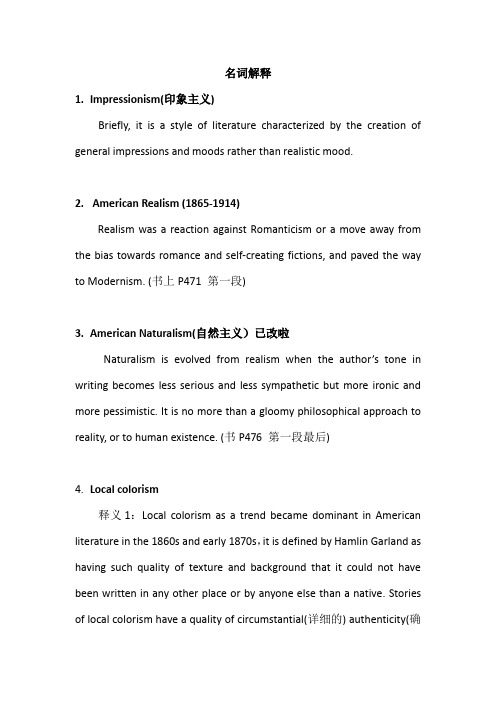
名词解释1.Impressionism(印象主义)Briefly, it is a style of literature characterized by the creation of general impressions and moods rather than realistic mood.2.American Realism (1865-1914)Realism was a reaction against Romanticism or a move away from the bias towards romance and self-creating fictions, and paved the way to Modernism. (书上P471 第一段)3.American Naturalism(自然主义)已改啦Naturalism is evolved from realism when the author’s tone in writing becomes less serious and less sympathetic but more ironic and more pessimistic. It is no more than a gloomy philosophical approach to reality, or to human existence. (书P476 第一段最后)4.Local colorism释义1:Local colorism as a trend became dominant in American literature in the 1860s and early 1870s,it is defined by Hamlin Garland as having such quality of texture and background that it could not have been written in any other place or by anyone else than a native. Stories of local colorism have a quality of circumstantial(详细的) authenticity(确实性), as local colorists tried to immortalize(使不朽) the distinctive natural, social and linguistic features. It is characteristic of vernacular(本国语) language and satirical(讽刺的) humor.释义2:Local colorism is a trend first made its presence felt in the late 1860s and early 1870s in America. It may be defined as the careful attention in speech, dress or behavior peculiar to a geographical locality.释义3:Local colorism is fiction and poetry that focuses on the characters, dialect, customs, topography, and other features particular to a specific region.5.The Lost generation释义1:It refers to a group of young intellectuals who came back from war,were injured both physically and mentally. Disillusioned and disgusted by the frivolous, greedy, and heedless way of life in America, they began to write and they wrote from their own experiences in the war. The best representative of the lost generation was Ernest Hemingway. (书P547)释义2:The lost generation is a term first used by Stein to describe the post-war I generation who are physically and psychologically scarred. (书P548)6.Imagism:释义1:It’s a poetic movement of England and the U.S. flourished from 1909 to 1917. The movement insists on the creation of images in poetry by “the direct treatment of the thing” and the economy of wording.释义2:Imagism came into being in Britain and U.S around 1910 as a reaction to the traditional English poetry to express the sense of fragmentation and dislocation.7.Free verseFree verse is poetry without a fixed beat or regular rhyme scheme.A looser and more open-ended syntactical structure is frequently favored. Whiteman’s poetry is an example of free verse at its most impressive.8.Transcendentalism:Transcendentalism is a philosophic and literary movement.It is a reaction against Rationalism and Calvinism. It appeared after 1830, marked the maturity of American Romanticism and the first Renaissance in the American literary history.9.Jazz AgeJazz age describe the period of 1920s and 1930s, the years between WW1 and WW2. With the rise of the Great Depression, the values of theage saw much decline. The most representative literature work is The Great Gatsby highlighting what some describe as the decadence and hedonism, as well as the growth of individualism.10.I ceberg Principle :It is a term used to describe the writing style of American writer Ernest Hemingway. The meaning of a piece is not immediately evident, because the crux of the story lies below the surface, just as most of the mass of a real iceberg similarly lies beneath the surface.11.M odernism(现代主义):Modernism is comprehensive but vague term for a movement, which began in the late 19th century and which has had a wide influence internationally during much of the 20th century. It is a reaction against realism. It rejects rationalism, which is the theoretical base of realism.12.O riginal sinThe wrong doing of one generation lives into the successive ones. Human beings are basically depraved and corrupted, hence, they should obey God to atone for their sins.13.P sychological Realism(心理现实主义)It is the realistic writing that probes deeply into the complexities of characters’ thoughts and motivations. Henry James is considered the founder of psychological realism. His novel The Ambassadors is considered to be a masterpiece of psychological realism.14.C olloquialismA colloquialism is a word, phrase or paralanguage that is employed in conversational or informal language but not in formal speech or formal writing.In a word, naturalism is evolved from realism when the author’s tone in writing becomes less serious and less sympathetic but more ironic and more pessimistic.。
新感觉派名词解释外国文学史
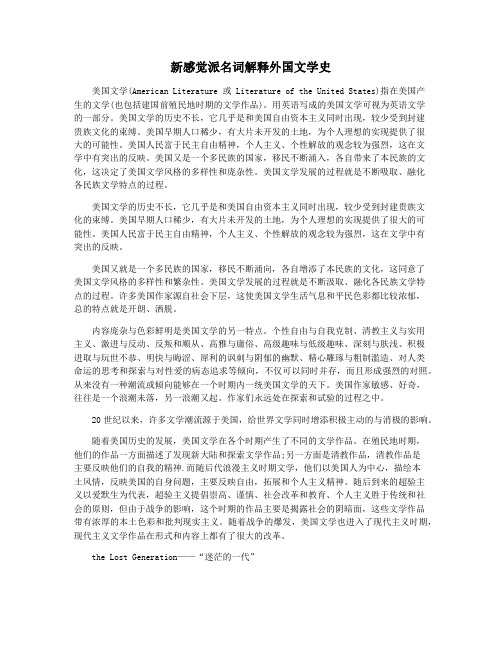
新感觉派名词解释外国文学史美国文学(American Literature 或 Literature of the United States)指在美国产生的文学(也包括建国前殖民地时期的文学作品)。
用英语写成的美国文学可视为英语文学的一部分。
美国文学的历史不长,它几乎是和美国自由资本主义同时出现,较少受到封建贵族文化的束缚。
美国早期人口稀少,有大片未开发的土地,为个人理想的实现提供了很大的可能性。
美国人民富于民主自由精神,个人主义、个性解放的观念较为强烈,这在文学中有突出的反映。
美国又是一个多民族的国家,移民不断涌入,各自带来了本民族的文化,这决定了美国文学风格的多样性和庞杂性。
美国文学发展的过程就是不断吸取、融化各民族文学特点的过程。
美国文学的历史不长,它几乎是和美国自由资本主义同时出现,较少受到封建贵族文化的束缚。
美国早期人口稀少,有大片未开发的土地,为个人理想的实现提供了很大的可能性。
美国人民富于民主自由精神,个人主义、个性解放的观念较为强烈,这在文学中有突出的反映。
美国又就是一个多民族的国家,移民不断涌向,各自增添了本民族的文化,这同意了美国文学风格的多样性和繁杂性。
美国文学发展的过程就是不断汲取、融化各民族文学特点的过程。
许多美国作家源自社会下层,这使美国文学生活气息和平民色彩都比较浓郁,总的特点就是开朗、洒脱。
内容庞杂与色彩鲜明是美国文学的另一特点。
个性自由与自我克制、清教主义与实用主义、激进与反动、反叛和顺从、高雅与庸俗、高级趣味与低级趣味、深刻与肤浅、积极进取与玩世不恭、明快与晦涩、犀利的讽刺与阴郁的幽默、精心雕琢与粗制滥造、对人类命运的思考和探索与对性爱的病态追求等倾向,不仅可以同时并存,而且形成强烈的对照。
从来没有一种潮流或倾向能够在一个时期内一统美国文学的天下。
美国作家敏感、好奇,往往是一个浪潮未落,另一浪潮又起。
作家们永远处在探索和试验的过程之中。
20世纪以来,许多文学潮流源于美国,给世界文学同时增添积极主动的与消极的影响。
美国文学名词解释
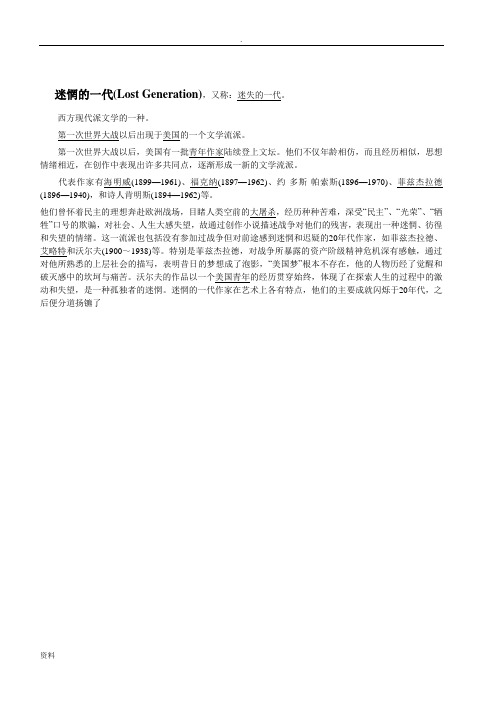
迷惘的一代(Lost Generation),又称:迷失的一代。
西方现代派文学的一种。
第一次世界大战以后出现于美国的一个文学流派。
第一次世界大战以后,美国有一批青年作家陆续登上文坛。
他们不仅年龄相仿,而且经历相似,思想情绪相近,在创作中表现出许多共同点,逐渐形成一新的文学流派。
代表作家有海明威(1899—1961)、福克纳(1897—1962)、约·多斯·帕索斯(1896—1970)、菲兹杰拉德(1896—1940),和诗人肯明斯(1894—1962)等。
他们曾怀着民主的理想奔赴欧洲战场,目睹人类空前的大屠杀,经历种种苦难,深受“民主”、“光荣”、“牺牲”口号的欺骗,对社会、人生大感失望,故通过创作小说描述战争对他们的残害,表现出一种迷惘、彷徨和失望的情绪。
这一流派也包括没有参加过战争但对前途感到迷惘和迟疑的20年代作家,如菲兹杰拉德、艾略特和沃尔夫(1900~1938)等。
特别是菲兹杰拉德,对战争所暴露的资产阶级精神危机深有感触,通过对他所熟悉的上层社会的描写,表明昔日的梦想成了泡影,“美国梦”根本不存在,他的人物历经了觉醒和破灭感中的坎坷与痛苦。
沃尔夫的作品以一个美国青年的经历贯穿始终,体现了在探索人生的过程中的激动和失望,是一种孤独者的迷惘。
迷惘的一代作家在艺术上各有特点,他们的主要成就闪烁于20年代,之后便分道扬镳了意象派诗歌意象派(Imagists)是1909年至1917年间一些英美诗人发起并付诸实践的文学运动,它是当时盛行于西方世界的象征主义文学运动的一个分支。
其宗旨是要求诗人以鲜明、准确、含蓄和高度凝炼的意象生动及形象地展现事物,并将诗人瞬息间的思想感情溶化在诗行中。
它反对发表议论及感叹。
意象派的产生最初是对当时诗坛文风的一种反拨,代表人物是埃兹拉·庞德。
由于意象派诗人大多经历了象征诗歌创作,所以理论界也有人将意象派看做象征主义的分支,实际上意象派和象征主义诗歌有极大的本质差异。
(完整word版)美国文学名词解释
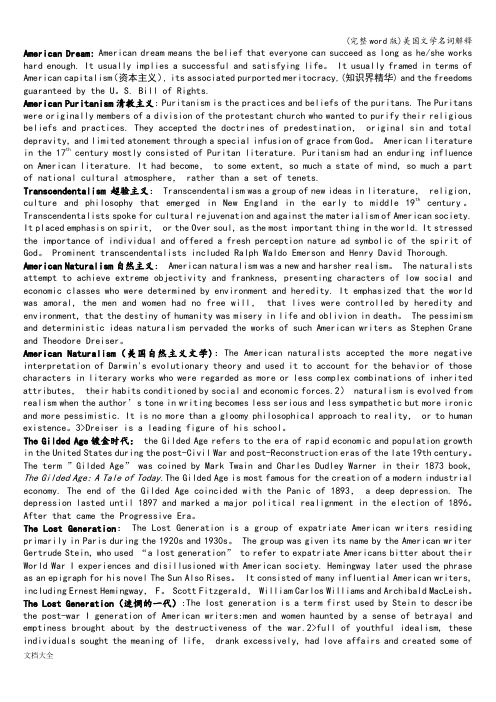
American Dream: American dream means the belief that everyone can succeed as long as he/she works hard enough. It usually implies a successful and satisfying life。
It usually framed in terms of American capitalism(资本主义), its associated purported meritocracy,(知识界精华) and the freedoms guaranteed by the U。
S. Bill of Rights.American Puritanism清教主义: Puritanism is the practices and beliefs of the puritans. The Puritans were originally members of a division of the protestant church who wanted to purify their religious beliefs and practices. They accepted the doctrines of predestination, original sin and total depravity, and limited atonement through a special infusion of grace from God。
American literature in the 17th century mostly consisted of Puritan literature. Puritanism had an enduring influence on American literature. It had become, to some extent, so much a state of mind, so much a part of national cultural atmosphere, rather than a set of tenets.Transcendentalism 超验主义: Transcendentalism was a group of new ideas in literature, religion,culture and philosophy that emerged in New England in the early to middle 19th century。
美国文学名词解释 -
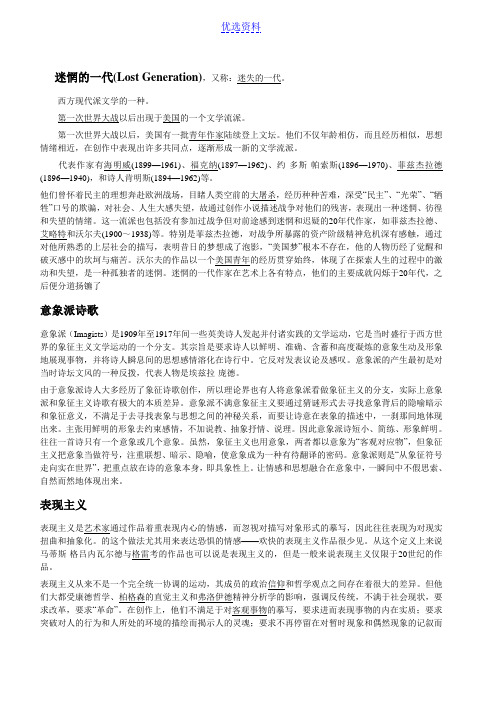
迷惘的一代(Lost Generation),又称:迷失的一代。
西方现代派文学的一种。
第一次世界大战以后出现于美国的一个文学流派。
第一次世界大战以后,美国有一批青年作家陆续登上文坛。
他们不仅年龄相仿,而且经历相似,思想情绪相近,在创作中表现出许多共同点,逐渐形成一新的文学流派。
代表作家有海明威(1899—1961)、福克纳(1897—1962)、约·多斯·帕索斯(1896—1970)、菲兹杰拉德(1896—1940),和诗人肯明斯(1894—1962)等。
他们曾怀着民主的理想奔赴欧洲战场,目睹人类空前的大屠杀,经历种种苦难,深受“民主”、“光荣”、“牺牲”口号的欺骗,对社会、人生大感失望,故通过创作小说描述战争对他们的残害,表现出一种迷惘、彷徨和失望的情绪。
这一流派也包括没有参加过战争但对前途感到迷惘和迟疑的20年代作家,如菲兹杰拉德、艾略特和沃尔夫(1900~1938)等。
特别是菲兹杰拉德,对战争所暴露的资产阶级精神危机深有感触,通过对他所熟悉的上层社会的描写,表明昔日的梦想成了泡影,“美国梦”根本不存在,他的人物历经了觉醒和破灭感中的坎坷与痛苦。
沃尔夫的作品以一个美国青年的经历贯穿始终,体现了在探索人生的过程中的激动和失望,是一种孤独者的迷惘。
迷惘的一代作家在艺术上各有特点,他们的主要成就闪烁于20年代,之后便分道扬镳了意象派诗歌意象派(Imagists)是1909年至1917年间一些英美诗人发起并付诸实践的文学运动,它是当时盛行于西方世界的象征主义文学运动的一个分支。
其宗旨是要求诗人以鲜明、准确、含蓄和高度凝炼的意象生动及形象地展现事物,并将诗人瞬息间的思想感情溶化在诗行中。
它反对发表议论及感叹。
意象派的产生最初是对当时诗坛文风的一种反拨,代表人物是埃兹拉·庞德。
由于意象派诗人大多经历了象征诗歌创作,所以理论界也有人将意象派看做象征主义的分支,实际上意象派和象征主义诗歌有极大的本质差异。
美国文学文学名词解释
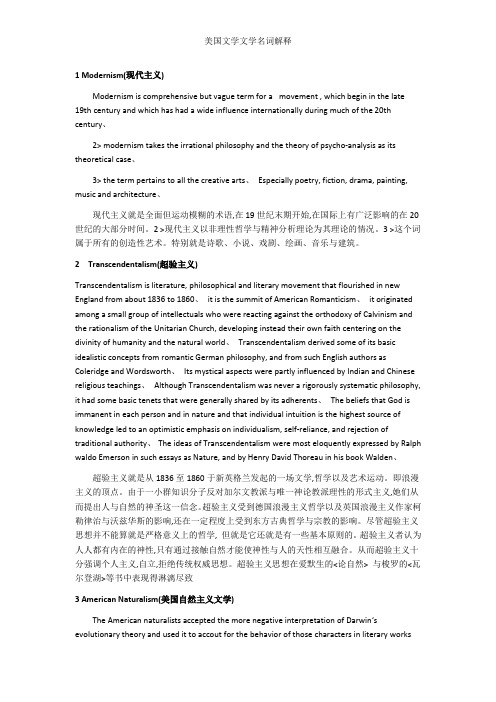
1 Modernism(现代主义)Modernism is comprehensive but vague term for a movement , which begin in the late19th century and which has had a wide influence internationally during much of the 20th century、2> modernism takes the irrational philosophy and the theory of psycho-analysis as its theoretical case、3> the term pertains to all the creative arts、Especially poetry, fiction, drama, painting, music and architecture、现代主义就是全面但运动模糊的术语,在19世纪末期开始,在国际上有广泛影响的在20世纪的大部分时间。
2 >现代主义以非理性哲学与精神分析理论为其理论的情况。
3 >这个词属于所有的创造性艺术。
特别就是诗歌、小说、戏剧、绘画、音乐与建筑。
2 Transcendentalism(超验主义)Transcendentalism is literature, philosophical and literary movement that flourished in new England from about 1836 to 1860、it is the summit of American Romanticism、it originated among a small group of intellectuals who were reacting against the orthodoxy of Calvinism and the rationalism of the Unitarian Church, developing instead their own faith centering on the divinity of humanity and the natural world、Transcendentalism derived some of its basic idealistic concepts from romantic German philosophy, and from such English authors as Coleridge and Wordsworth、Its mystical aspects were partly influenced by Indian and Chinese religious teachings、Although Transcendentalism was never a rigorously systematic philosophy, it had some basic tenets that were generally shared by its adherents、The beliefs that God is immanent in each person and in nature and that individual intuition is the highest source of knowledge led to an optimistic emphasis on individualism, self-reliance, and rejection of traditional authority、The ideas of Transcendentalism were most eloquently expressed by Ralph waldo Emerson in such essays as Nature, and by Henry David Thoreau in his book Walden、超验主义就是从1836至1860于新英格兰发起的一场文学,哲学以及艺术运动。
美国文学名词解释

美国文学名词解释美国文学是指美国国内所产生的文学作品,包括小说、诗歌、剧本等各种文学体裁。
它具有自己的特点和风格,反映了美国人的文化、价值观念和思想观念。
美国文学中有许多特殊的名词和术语,下面是其中一些常见的名词解释:1. Puritanism(清教主义): 清教主义是美国文学发展的重要起点之一,它是在17世纪早期由清教徒带入美洲的思想和信仰体系。
清教徒强调个人责任和纯洁的生活方式,他们的文学作品通常传达着信仰、奋斗和自我批判的主题。
2. American Renaissance(美国文艺复兴): 美国文艺复兴指的是19世纪中期到20世纪初期的一个时期,这个时期出现了一大批杰出的美国作家和作品。
其中包括威廉·福柯特、纳撒尼尔·霍桑、赫尔曼·梅尔维尔等人的文学作品。
这些作品在内容、风格上更加关注人性、自然和道德等问题。
3. Realism(现实主义): 现实主义是19世纪末至20世纪初的一种文学流派,在美国文学发展史中具有重要的地位。
现实主义作家力求以客观、真实的方式描绘生活中的人和事,关注社会问题和个人命运。
马克·吐温和亨利·詹姆斯被认为是现实主义文学中最有影响力的作家。
4. Harlem Renaissance(哈莱姆文艺复兴): 哈莱姆文艺复兴是20世纪20年代至30年代期间,在纽约哈莱姆区集中发展起来的一种文化和艺术运动。
这个运动推动了非洲裔美国人在文学、音乐、舞蹈和绘画等领域的发展。
其中包括作家朗斯顿·休斯、小说家托妮·莫里森等的作品被认为是哈莱姆文艺复兴的代表作。
5. Beat Generation(垮掉的一代): 垮掉的一代是20世纪50年代和60年代期间在美国兴起的一种文学和文化运动。
这个运动反对传统社会规范和价值观,追求自由和个性的表达。
杰克·凯鲁亚克和艾伦·金斯堡是这个运动的代表作家,他们的作品通常以自由、追求和反叛为主题。
美国文学名词解释完整版
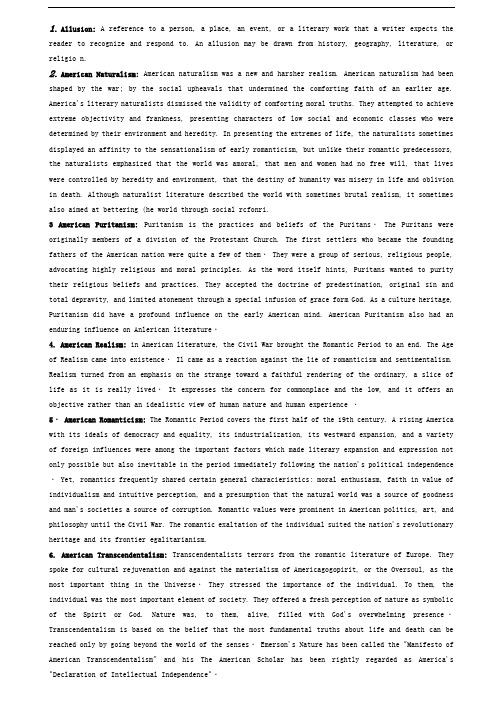
1.Allusion: A reference to a person, a place, an event, or a literary work that a writer expects the reader to recognize and respond to. An allusion may be drawn from history, geography, literature, or religio n.2.American Naturalism: American naturalism was a new and harsher realism. American naturalism had been shaped by the war; by the social upheavals that undermined the comforting faith of an earlier age. America's literary naturalists dismissed the validity of comforting moral truths. They attempted to achieve extreme objectivity and frankness, presenting characters of low social and economic classes who were determined by their environment and heredity. In presenting the extremes of life, the naturalists sometimes displayed an affinity to the sensationalism of early romanticism, but unlike their romantic predecessors, the naturalists emphasized that the world was amoral, that men and women had no free will, that lives were controlled by heredity and environment, that the destiny of humanity was misery in life and oblivion in death. Although naturalist literature described the world with sometimes brutal realism, it sometimes also aimed at bettering (he world through social rcfonri.3 American Puritanism: Puritanism is the practices and beliefs of the Puritans・The Puritans were originally members of a division of the Protestant Church. The first settlers who became the founding fathers of the American nation were quite a few of them・ They were a group of serious, religious people, advocating highly religious and moral principles. As the word itself hints, Puritans wanted to purity their religious beliefs and practices. They accepted the doctrine of predestination, original sin and total depravity, and limited atonement through a special infusion of grace form God. As a culture heritage, Puritanism did have a profound influence on the early American mind. American Puritanism also had an enduring influence on Anlerican literature・4. American Realism: in American literature, the Civil War brought the Romantic Period to an end. The Age of Realism came into existence・ Il came as a reaction against the lie of romanticism and sentimentalism. Realism turned from an emphasis on the strange toward a faithful rendering of the ordinary, a slice of life as it is really lived・It expresses the concern for commonplace and the low, and it offers an objective rather than an idealistic view of human nature and human experience ・5・ American Romanticism: The Romantic Period covers the first half of the 19th century. A rising America with its ideals of democracy and equality, its industrialization, its westward expansion, and a variety of foreign influences were among the important factors which made literary expansion and expression not only possible but also inevitable in the period immediately following the nation's political independence ・ Yet, romantics frequently shared certain general characieristics: moral enthusiasm, faith in value of individualism and intuitive perception, and a presumption that the natural world was a source of goodness and man's societies a source of corruption. Romantic values were prominent in American politics, art, and philosophy until the Civil War. The romantic exaltation of the individual suited the nation's revolutionary heritage and its frontier egalitarianism.6. American Transcendentalism: Transcendentalists terrors from the romantic literature of Europe. They spoke for cultural rejuvenation and against the materialism of Americagogopirit, or the Oversoul, as the most important thing in the Universe・They stressed the importance of the individual. To them, the individual was the most important element of society. They offered a fresh perception of nature as symbolic of the Spirit or God. Nature was, to them, alive, filled with God's overwhelming presence・Transcendentalism is based on the belief that the most fundamental truths about life and death can be reached only by going beyond the world of the senses・ Emerson's Nature has been called the "Manifesto of American Transcendentalism" and his The American Scholar has been rightly regarded as America's ^Declaration of Intellectual Independence^・7.Dramatic monologue: A kind of narrative poem in which one character speaks to one or more listeners whose replies are not given in the poem. The occasion is usually a crucial one in the speaker's personality as well as the incident that is the subject of the poem.8.Enlightenment: With the advent of the 18th century, in England, as in other European countries, there sprang into life a public movement known as the Enlightenment. The Enlightenment on the whole, was an expression of struggle of the then progressive class of bourgeois against feudalism. The egogo inequality, stagnation. prejudices and other survivals of feudalism. The attempted to place all branches of science at the service of mankind by connecting them with the actual deeds and requirements of the people・9.Imagism: Il’s a poetic movement of England and the U.S. flourished from 1909 to 1917.The movement insists on the creation of images in poetry by "the direct treatment of the thing" and the economy of wording. The leaders of this movement were Ezra Pound and Amy Lowell.10.Local Colorism: Local Colorism or Regionalism as a trend first made its presence felt in the late lX6()s and early seventies in America・may be defined as the careful attegogoms in speech, dress or behavior peculiar to a geographical locality. The ultimate aim of the local colorists is to create the illusion of an indigenous little world with qualities that tell it apart from the world outside・ The social and intellectual climate of the country provided a stimulating milieu for the growth of local color fiction in America. Local colorists concerned themselves with presenting and inleqxeting the local character of their regions. They tended to idealize and glorify, but they never forgot to keep an eye on the truthful color of local life. They formed an imporlanl part of the realistic movement. Although it lost its momentum toward the end of the 19th century, the local spirit continued to inspire and fertilize the imagination of author.IL Lost Generation; This term has been used again and again to describe the people of the postwar years ・ 1( describes the Americans who remained in Paris as a colony of “ expatriates^ or exiles. Il describes the writers like Hemingway who lived in semi poverty. It describes the Americans who returned to their native land with an intense awareness of living in an unfamiliar changing world・ The young English and American expatriates, men and women, were caught in the war and cut off from the old values and yet unable to come to terms with the new era when civilization had gone mad. They wandered pointlessly and restlessly, enjoying things like fishing, swimming, bullfight and beauties of nature, but they were aware all the while that the world is crazy and meaningless and futile・ Their whole life is undercut and defeated・12.Beat Generation: the Beat writers were a small group of close friends first, and a movement later. The term "Beat Generation" gradually came to represent an entire period in lime, but the entire original Beat Generation in literature was small enough to have fit into a couple of cars. The lenn was created by Jack Kerouac in 1948・The original word meant nothing more than "bad" or “ruined" or '*spent M or "beaten-down, beaten-up and beaten-out M. The connotation is defeat, resignation, and disappointment.This kind of beatness is what Kerouac was describing in himself and his friends, bright young Americans who had come of age during WWII but couldn't fit in as clean-cut soldiers or complacent young businessmen. They were beat because they dicing believe in straight jobs and had to struggle to survive, living in dirty apartments, selling drugs or committing crimes for food money hitchhiking across the country because they couldn't stay still without getting bored. But the term "beat^ had a second meaning: beatific or sacred and holy. Kerouac, a devout Catholic, explained many times that bydescribing his generation as beat he was trying to capture the secret holiness of the down trodden. In fact, this is probably the most central theme in Kerouac's work・The Beats were essentially anarchic・ They rejected conventional social and moral values; expressedtheir alienation in their works from conventional “square" society by adopting a life style which featuredsex, drugs, jazz and the freedom of the open road. Literally, the Beats were all experimenters who sought to express spontaneity of thought and feeling in a seemingly formless verse as Ginsberg did or prose as Kerouac・ They tended to blur the line between poetry and prose in their writing, adopting rhythms of simple American speech and of so-called progressive jazz, so such so that the Beat style was criticized as likely to contribute more to American slang than to American letters. Perhaps in this sense they are postmodernist.13.Pre-Romanticism: It originated among the conservative groups of men and letters as a reaction against Enlightenment and found its most manifest expression in the **Gothic novel0. The term arising from the fact that the greater part of such romances were devoted to the medieval times.14.Psalm: A song or lyric poem in praise of God・15.Psychological Realism: It is the realistic writing that probes deeply into the complexities of characters, thoughts and motivations・ Henry James is considered the founder of psychological realism・His novel The Ambassadors is considered to be a masterpiece of psychological realism・16.Renaissance: The term originally indicated a revival of classical (Greek and Roman)arts and sciences after the dark ages of medieval obscurantism.17.Romanticism: A movement that flourished in literature, philosophy, music, and art in Western culture during most of the 19th cenlury、beginnigogom.18.Satire: A kind of writing that holds up to ridicule or contempt the weaknesses and wrongdoings of individuals, groups, institutions, or humanity in general. The aim of satirists is to set a moral standard for society, and they attempt to persuade rhe reader to see their point of view through the force of laughter.19.Symbol: A symbol is a sign which suggests more than its literal meaning. In other words, a symbol is both literal and figurative・ A symbol is a way of telling a story and a way of conveying meaning. The best symbols are those that are believable in the lives of the characters and also convincing as they convey a meaning beyond the literal level of the story. If the symbol is obscure or ambiguous, then the very obscurity and the ambiguity may also be part of the meaning of the story.20.Symbolism: Symbolism is the writing technique of using symbols. Il's a literary movement that arose in France in the last half of the 19th century and that greatly influenced many English writers, particularly poels, of the 20th century. Il enables poets to compress a very complex idea or set of ideas into one image or even one word. Il's one of the most powerful devices that poets employ in creation.2LModernisni:It was a con lplex and diverse international move mem in all the creative artsoriginoting about the end of the 19th century. It provided the greatest creative renaissance of the 20thcentury. It was made up of many facets, such as symbolism, surrealism (超现实上义),cubism (立体丄义),expressionism, futurism (未来上义),ect22Amcrican Drcam: American dream means the belief thau everyone can succeed as long as he/she works hard enough. Il usually implies a successful and satisfying life. It usually framed in terms of American capitalism (资木上义),its associated purported meritocracy,(知识界精华)and the freedoms guaranteed by the U.S・ Bill of Rights.23.The Harlem Renaissance:refers to the flowering of African American literature, art, and drama during the 1920s and 1930s. Though centered in Harlem, New York, the movement impacted urban centers throughout the United States. Black novelists, poels, painters, and playwrights began creating works rooted in their own culture instead of imitating the styles of Europeans and white American.24.fret verse:: poetry without a fixed beat or regular rhyme scheme or line length and depends on naturalspeech rhythms, the ebb and flow or cadences of speech・ and the counterpoint of stressed and unstressed syllables・ In conventional verse the unit is the foot, or, perhaps, the line, while in free verse the unit is the stanza or strophe syllables. Fee verse is not written in definite stanzas. The great majority of his poems depends on parallelism and other reiterative devices for its structure and cadence・ 1( is exactly as its name implies—free, free to wander the printed page that the poet's will, free to create pictures in random order. Imagery is very important in free verse since the poem has to capture the reader's imagination with words alone, unaided by these old favorite rhyme and mete匚。
- 1、下载文档前请自行甄别文档内容的完整性,平台不提供额外的编辑、内容补充、找答案等附加服务。
- 2、"仅部分预览"的文档,不可在线预览部分如存在完整性等问题,可反馈申请退款(可完整预览的文档不适用该条件!)。
- 3、如文档侵犯您的权益,请联系客服反馈,我们会尽快为您处理(人工客服工作时间:9:00-18:30)。
Transcendentalism: It is a philosophical view, a notion, a concept, an idea, a way of looking at things, a set of attitudes about man, God, and the universe, a way of how to get to the basic truth of the universe. Transcendentalism was neither logical nor systematized. It exalted feeling over reason, individual expression over the restraints of law and custom.They believe in the transcendence of "over soul", an all-pervading power for goodness from which all things come and of which all things are a part. Representatives are Emerson,believed that man was a part of absolute good, Thoreau,beheld divinity in the “unspotted innocence” of nature.American Romanticism:①Romanticism was a rebellion against the objectivity of rationalism. For romantics, the feelings, intuitions and emotions were more important than reason and common sense. They stressed the close relationship between man and nature, emphasized individualism and affirmed the inner life of the self. ②American writers shared some common features with the English Romanticists, while American romanticism exhibited from the very outset distinct features of its own.③The American Puritanism asa cultural heritage exerted great influences over American moral values. ④Americanromantics tended more to moralize rather than to entertain.⑤Romantic values were prominent in American politics, art, and philosophy until the Civil War.American Puritanism: The “Puritan”was “a would-be purifier”. Puritans wanted to make pure their religious beliefs and practices, and believed that God decides everything and they are God’s chosen people. Their purposes are for religious freedom and political freedom. Hard work, thrift, piety, and sobriety were the Puritan spirit that dominated much of the earliest American writing (including the sermons, books, and letters of such noted Puritan clergyman as John Cotton and Cotton Mather). The major intellectual spokesmen of Puritanism are John Cotton, Roger Williams.Naturalism: A new and harsher realism,a view of human beings as passive victims of natural forces and social environment. The naturalists emphasized that the world was amoral, that men and women had no free will, that their lives were controlled by heredity and the environment; the religious “truths” were illusory, that the destiny of humanity was misery in life and oblivion in death. Representatives are:Stephen Crane, Frank Norris, Jack London , Theodore DreiserRealism: It appeared in the United States in the literature of local color, an amalgam of romantic plots and realistic descriptions of things was immediately observable. The dialects, customs, sights. Important figures of realism: William Howells; Hamlin Garland; Mark Twain; Henry JamesFree verse:A kind of poetry that doesn’t’t conform to any regular meter and rhyme.The difference between free verse and blank verse is that blank verse has no rhyme, but it should be iambic pentameter.Lost Generation:①It refers to the post-World War I generation, but specifically a group of expatriates who left America and formed a community of writers and artists in Paris, involved with other European novelists and poets in their experimentation on new modes of thought and expression. ②The term stems from a remark made by Gertrude Stein to Ernest Hemingway, “You are all a lost generation”, of which Hemingway used “the Lost Generat ion” as an epigram to The Sun Also Rises. ③The generation was “lost” in the sense that its inherited values were no longer relevant in the postwar world because of its spiritual alienation from a U. S. that seemed to its members to be hopelessly provincial, materialistic and emotional barren. ④The term embraces Hemingway, Fitzgerald, Pound, Williams, and many other writers who made Paris the center of their literary activities in the 1920sDeism: is a religious philosophy and movement that derives the existence and nature of God from reason and personal experience.Emersonian Transcendentalist:①It is actually a philosophical school which absorbed some ideological concerns of American Puritanism and European Roma nticism, with itsfocus on the intuitive knowledge of human beings to grasp the absolute in the universe and the divinity of man.②Ralph Emerson bases his religion on an intuitive belief in an ultimate unity, which he calls “over-soul.” He be lieves that there should be emotional communication between an individual soul and the universal “over-soul.”③Ralph Emerson puts stress on the ideal individual, a self-reliant man, who ④For Ralph Emerson, nature is emblematic of the spiritual world, alive with God’s overwhelming presence; hence, it exercises a healthy and restorative influence on human mind.Enlightenment and American Revolution:1). all the leaders of the revolution were influenced by the Enlightenment, representatives: Benjamin Franklin, Thomas Paine, Thomas Jefferson, etc. 2). The new nation was set on the basic ideas and principles of the Enlightenment.Enlightenment:1).an intellectual movement 2)the power of human reason 3)the scientific idea;4)the idea of progressModernism:It is loosely a synonym of anything contemporary. Strictly, especially in literary criticism, this began in the late 19th century and the theory of psycho-analysis as its theoretical base. They pay more attention to the psychic time than the chronological one. 现代主义的标志:T. S. Eliot’s The Waste LandRomanticism Characteristics: Romantics frequently shared certain general characteristics: moral enthusiasm, faith in the value of individualism and intuitive perception, and a presumption that the natural world was a source of goodness and man’s societies a source of corruptionLocal colorism: Realism first appeared in the United States in the literature of local color, an amalgam of romantic plots and realistic descriptions of things was immediately observable;the dialects, customs, sights, and sounds of regional America. Bret Harte was the first American writer of local color to achieve wide popularity, presenting stories of western mining towns with colorful gamblers, outlaws, and scandalous women. Harte, Harriet Beecher Stowe, Kate Chopin, Joel Chandler Harris, and Mark Twain provided regional stories and tales of the life of America’s Westerners, Southerners, and Easterners. Local color fiction reached its peak of popularity in the 1880s, but by the turn of the century it had begun to decline.How does Sister Carrie embody Dreiser’s naturalistic belief?①In this novel, Dreiser expressed his naturalistic pursuit by expounding the purposelessness of life and attacking the conventional moral standards. ②The novel best embodies his naturalistic belief that while men are controlled by heredity, instinct and chance, a few extraordinary and unsophisticated human beings refuse to accept their fate wordlessly and instead strive, unsuccessfully, to find meaning and purpose for their existence. ③To Sister Carrie, the world is cold and harsh. Alone, helpless, she moves along like a mechanism driven by desire and catches blindly at any opportunities for a better existence, opportunities first offered by Drouet, and then by Hurstwood. A feather in the wind, she was totally at the mercy of forces she cannot comprehend, still less to say control. The famous picture of Carrie sitting in a rocking chair in her room in the evening, rocking back and forth, is a picture of Carrie’s drifting with the tide. She has no control, no freedom of will.。
